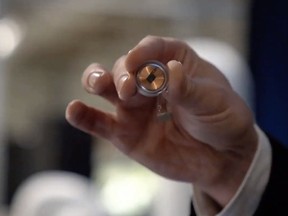Elon Musk’s Neuralink Cleared for Brain Chip Trials in Canada
A New Frontier in Neurosurgery: UHN Announces Participation in Neuralink Trial
The University Health Network (UHN) has made a groundbreaking announcement, stating that its Toronto Western Hospital will be the first non-U.S. site for a clinical trial of a device created by Neuralink Corp., Elon Musk’s brain-implant company. This development marks a significant milestone in the field of neurosurgery and highlights the innovative work being done by Neuralink to revolutionize human cognition.
UHN’s Commitment to Advancing Neurological Research
"We are incredibly proud to be at the forefront of this research advancement in neurosurgery," said UHN chief executive Kevin Smith in an announcement. He also noted that UHN would be the ‘first and exclusive’ site for the trial in Canada, but did not provide a specific timeline for when it will begin.
Health Canada Approves Neuralink’s Clinical Trial
On November 20th, Neuralink announced on social media platform X (owned by Musk) that Health Canada had approved the launch of its first clinical trial in Canada. The company posted: "Health Canada has approved the launch of our first clinical trial in Canada! Recruitment is now open." This development indicates that Neuralink is moving forward with its plans to conduct clinical trials in the Canadian market.
Recruitment Open for Patients with Quadriplegia Due to ALS or SCI
Neuralink’s first product aims to enable patients to control external devices, such as computers, using their thoughts. The company is seeking patients with quadriplegia due to ALS (Amyotrophic Lateral Sclerosis) or spinal cord injury (SCI). These individuals may qualify for the clinical trial and can learn more by visiting Neuralink’s Patient Registry.
Neuralink’s Device: A Breakthrough in Neurotechnology
Neuralink’s device is designed to allow patients to interact with external devices using their thoughts. This technology has the potential to revolutionize the lives of individuals living with neurological conditions, enabling them to communicate and interact with their environment in ways previously unimaginable.
Future Applications of Neuralink’s Technology
While the initial focus of Neuralink’s device is on treating conditions such as quadriplegia, the company has also announced plans to explore other applications. These include the treatment of blindness and potentially even augmenting memory functions in healthy individuals. This expansion of Neuralink’s goals underscores the company’s commitment to pushing the boundaries of what is possible with neurotechnology.
Recruitment for Clinical Trials: A Global Effort
Neuralink has been actively recruiting patients for its clinical trials across multiple regions, including the United States, United Kingdom, and Canada. This effort highlights the global interest in Neuralink’s technology and the potential it holds for transforming human cognition.
Other Companies in the Field: Synchron Inc.
While Neuralink is a pioneer in this field, other companies like Synchron Inc. are also making significant strides. Synchron is recruiting patients for its own future trials, underscoring the growing interest in neurotechnology and the potential it holds for improving human lives.
Conclusion
The approval of Neuralink’s clinical trial by Health Canada marks a major milestone in the development of this innovative technology. As UHN’s commitment to advancing neurological research demonstrates, there is a clear recognition of the potential benefits that Neuralink’s device could bring to patients living with quadriplegia due to ALS or SCI.
The Future of Neurotechnology: A New Era for Human Cognition
As Neuralink continues to push the boundaries of what is possible with neurotechnology, it is clear that we are on the cusp of a revolution in human cognition. The possibilities and potential applications of this technology are vast and hold promise for transforming lives across the globe.
Comments Section: Join the Conversation
- Share your thoughts on Neuralink’s technology and its potential to transform human cognition.
- Engage with others who are interested in neurotechnology and its implications for society.
- Ask questions or seek clarification on any aspect of Neuralink’s device or clinical trial.



